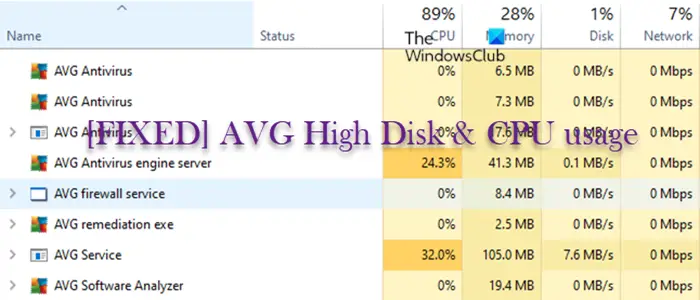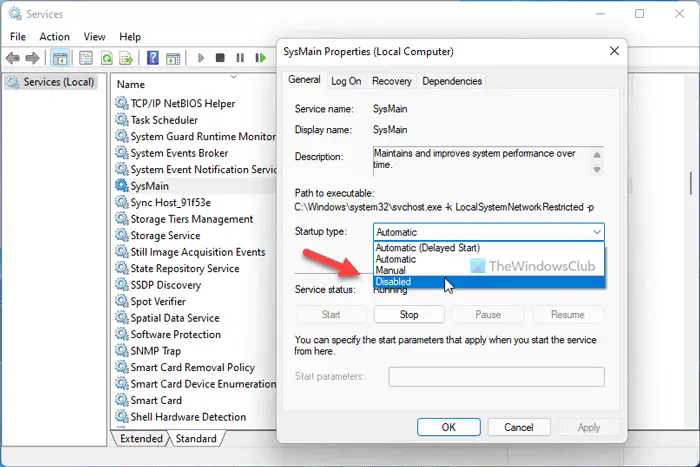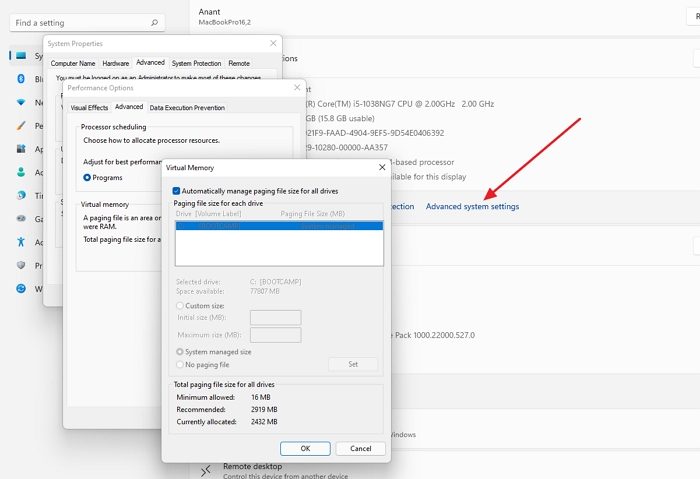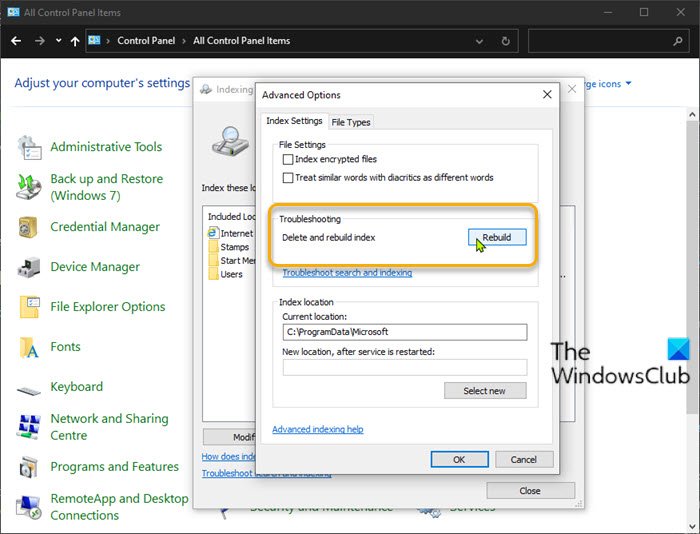Sometimes, you may get random Disk Usage Spikes on your Windows 11 or Windows 10 computer. But. if you are noticing persistent AVG High Disk & CPU usage on your PC, then this post is intended to help you with easy solutions.

Fix AVG High Disk & CPU usage
If you are experiencing AVG High Disk & CPU usage on your Windows 11/10 device, you can try our recommended suggestions in no particular order below to get the issue resolved in no time with less hassle!
We suggest you first make sure to restart your PC and see. Then make sure you update Windows and as well quickly close or stop background applications that you think are unnecessary, and see if the issue at hand is resolved or not – before you proceed. Also, make sure all drivers and firmware are updated and delete temporary files and run CHKDSK for good measure.
- Disable Superfetch
- Run a full antivirus scan
- Reset or reinstall OneDrive
- Rebuild the Windows Search index
- Reset Virtual Memory or Page File
Let’s see the mentioned solutions in detail.
1] Disable Superfetch

If your hard disk is full, and if any Superfetch enrty shows up high on the list in Task Manager, you’re dealing with a Superfetch problem which is causing the AVG High Disk & CPU usage on your Windows 11/10 device. Superfetch, or Service Host Superfetch analyzes your usage patterns, such as when you launch certain applications and how often. Superfetch then preloads data from those programs into your memory. In most cases, this works quite well, especially on older hard disks. But it’s not perfect.
However, some PC users especially gamers complain that Superfetch causes constant hard disk usage, as the process tends to preload the files of a game it thinks you want to play, while you’re actually playing a different game. Luckily, you don’t need and can disable Superfetch — there are other ways to speed up your PC.
2] Run a full antivirus scan
If you check in Task Manager, and you are seeing an unknown program with super-high disk or memory usage, then It might be a virus, spyware, or other malware clearly hoggging system resources. In addition to messing with your PC’s performance, malware can also steal your personal information, corrupt files or apps, and wreak other havoc. In this case, your best option at remedying the issue in view is to run a full system antivirus scan with Windows Defender or any reputable third-party AV product to get rid of viruses and malware immediately.
Keep in mind that high disk usage can also be caused by antivirus software — during a background scan, or if the tool malfunctions and gets stuck. In cases like this, navigate into your antivirus tool’s dashboard to see if a scan is in process. If so, do not stop the task as your antivirus may be dealing with a nasty piece of malware. On the other hand, if the scan seems frozen, reboot your system and let it sit for a while until the antivirus stops. If it doesn’t stop, then you might need to reinstall the antivirus, update it, or switch to an alternative resource-light solution.
Read: Malwarebytes high CPU and Memory usage
3] Reset or reinstall OneDrive
Synchronization tools like OneDrive or Dropbox take time to synchronize all files. But they can sometimes get stuck and push disk usage to 100% if they’re still trying to synchronize after the process is done. That happens often with large amounts of data. In this case, to fix this, you can reset the programs or reinstall them. For example, you can reset OneDrive – OneDrive will reset and resync your files. This often solves issues with constant disk usage. So check to see if it’s your sync tool clogging up your disk, and try a repair install to fix it.
Read: OneDrive high CPU or Memory usage problem
5] Reset Virtual Memory or Page File

Whenever your PC runs out of free memory (RAM), it uses a “page file” on your hard disk to expand its memory. Let’s say you’re editing a 10 GB video file, but you have only 8 GB of memory (at least 2 to 3 GB of which are taken up by Windows and your apps). Your PC will use the page file on your disk as expanded memory.
Over time, this page file can become defective and cause unexpected slowdowns and high disk usage. To fix it, you can reset the Virtual Memory or Page File on your Windows 11/10 PC.
Read: Back up, Move, or Delete PageFile.sys on shutdown
4] Rebuild the Windows Search Index

The Windows Search Index helps you find files, folders, emails, and even the content of some of those files instantly. To do that, it scans your hard disk and turns it into a super-fast index to give you immediate results. However, even as useful Windows Search Index can be, the search feature can lose control as it keeps on indexing, with no end in sight — all the way up to 100% disk usage. In such cases and to resolve any apparent issues, it’s best to rebuild the search index.
Related post: Avast Service High CPU & Disk Usage
Why is AVG using all my disk?
A bug in an outdated driver could push Windows 10 to 100% disk usage. You can update your graphics drivers and ensure you have the latest audio drivers. You can make things easier with Driver Update Software for Windows 11/10 PC, which can scan 8 million drivers, so you don’t have to hunt around and update each one.
Why is my disk always at 100?
If your disk is at 100% usage, you may be able to lower disk usage by checking for viruses, resetting your virtual memory, performing a clean boot, or wiping your hard drive. However, before trying these out, a simple restart might also clear up the issue. Also, make sure you have a clear understanding when performing advanced troubleshooting, and use an Administrator account.